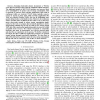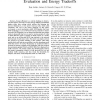66 search results - page 5 / 14 » Reducing Network Energy Consumption via Sleeping and Rate-Ad... |
MOBICOM
2003
ACM
14 years 29 days ago
2003
ACM
Reducing the energy consumption by wireless communication devices is perhaps the most important issue in the widely-deployed and exponentially-growing IEEE 802.11 Wireless LANs (W...
TMC
2010
13 years 2 months ago
2010
Emerging dual-mode phones incorporate a Wireless LAN (WLAN) interface along with the traditional cellular interface. The additional benefits of the WLAN interface are, however, lik...
ICCCN
2008
IEEE
14 years 2 months ago
2008
IEEE
Abstract—Energy efficiency is a central challenge in batteryoperated sensor networks. Current energy-efficient mechanisms employ either duty cycling, which reduces idle listeni...
SIGCOMM
2010
ACM
13 years 8 months ago
2010
ACM
Energy consumption is a major and costly problem in data centers. A large fraction of this energy goes to powering idle machines that are not doing any useful work. We identify tw...
IJSNET
2006
13 years 7 months ago
2006
: In this paper, we present a two-tiered scheduling approach for effective energy conservation in wireless sensor networks. The effectiveness of this mechanism relies on dynamicall...


